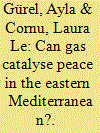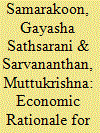| Srl | Item |
| 1 |
ID:
132382


|
|
|
|
|
| Publication |
2014.
|
| Summary/Abstract |
The economic rationale for energy collaboration between Turkey, Cyprus and Israel is compelling. Cyprus and Israel need commercially viable export routes for their gas while Turkey is eager to diversify and increase its gas supplies. Hydrocarbon resources could potentially be a catalyst for both bringing about a Cyprus settlement and a Turkey-Israel rapprochement. A trilateral cooperation scheme involving a Turkey-Israel pipeline and an LNG plant in Cyprus could offer strong commercial incentives to all parties. But it would require bold political vision on the part of the region's leaders, coupled with backing from influential external actors with an interest in reconciliation and stability in the Eastern Mediterranean.
|
|
|
|
|
|
|
|
|
|
|
|
|
|
|
|
| 2 |
ID:
132736


|
|
|
|
|
| Publication |
2014.
|
| Summary/Abstract |
Are preferential trade agreements (PTAs) in the Asia-Pacific region merely a political phenomenon with no economic basis, as some critics say? I challenge this interpretation; in this article I present an explanatory model based on intra-industry trade to indicate what economic interests should drive Japanese and South Korean PTAs with ASEAN partners, and derive specific predictions. An analysis of the actual tariff barrier elimination in the agreements suggests important, but highly specific, economic benefits. First, preference margins are substantively greater for intra-industry trade, and second, intra-industry trade is much less likely to be excluded from tariff reductions when imported into Japan or South Korea. This indicates that PTAs help firms specialize their production throughout the region, and provides an economic rationale for these agreements. A qualitative case study of the Japan-Malaysia PTA and a statistical analysis of tariff liberalization in the PTAs of Japan and South Korea with the ASEAN countries support this view.
|
|
|
|
|
|
|
|
|
|
|
|
|
|
|
|
| 3 |
ID:
191584


|
|
|
|
|
| Summary/Abstract |
The Governments of India and Sri Lanka signed a Memorandum of Understanding (MoU) to build a bridge across the Palk Strait in July 2002 to join the island nation with the mainland of South Asia by road and rail. The objective of this article is to highlight the likely impact the proposed bridge would have on trade in goods and services and travel between the two countries and beyond. The overall argument herein is that any development activity would have positive and negative outcomes and that on a balance of probability, the positive outcomes of the proposed bridge could outweigh the negative outcomes. The proposed bridge across the Palk Strait could be an alternative to the proposed Sethusamudram project (that could potentially cause environmental damage) rekindled by the Tamil Nadu state assembly in January 2023 in order to stimulate economic growth in the lagging southern parts of Tamil Nadu.
|
|
|
|
|
|
|
|
|
|
|
|
|
|
|
|